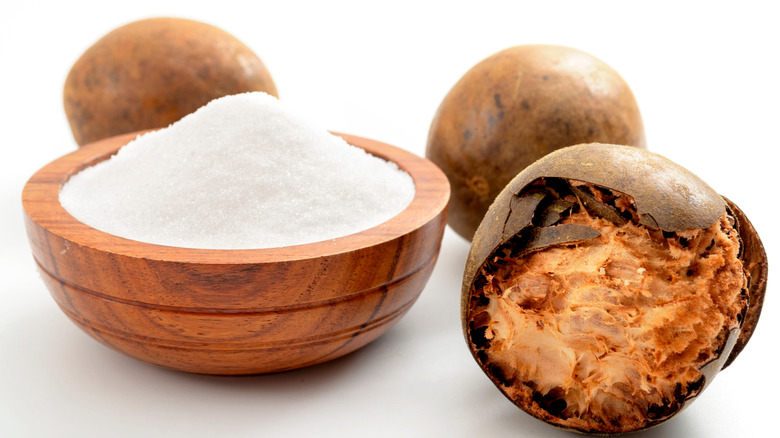Keto Foodies Can Enjoy Tiramisu With A Simple Sweetener Swap
We may receive a commission on purchases made from links.
Keto eaters may have no trouble finding keto-friendly bites at their favorite fast food joints or other restaurants. But things can get tricky when it comes to navigating the dessert course. After all, the primary goal of the keto diet is to majorly cut down on the body's reliance on glucose (aka sugar), and that certainly makes it a lot harder to find a suitable dish to satisfy your sweet tooth — but not completely impossible.
Take, for example, tiramisu. Crafted with spongy layers of coffee-dipped ladyfingers, a fluffy mix of egg yolks, sugar, and mascarpone cheese, and a dusting of cocoa powder to top it all off, the Italian treat tastes as decadent as it looks. But you might be surprised to learn that many of its ingredients are, in fact, keto-friendly (or can easily be made so). Save for the sugar, of course. However, with one simple swap, you can turn it into a dessert that won't derail your diet. The secret? Using monk fruit. The non-sugar sweetener is great for keto cooking because it doesn't add any calories or carbohydrates to the food but packs a potent punch.
In addition to opting for a keto-friendly cookie (like almond flour shortbread) instead of traditional ladyfingers, you can substitute sugar with monk fruit sweetener at a one-to-one ratio — or even use a bit less, given its flavor. So if you're looking to tweak a traditional tiramisu recipe to better fit your dietary needs, some monk fruit sweetener is all you need.
What is monk fruit sweetener?
Monk fruit sweetener is sourced from the Chinese gourd also known as Luo Han Guo, and it's a popular natural alternative to sugar given its taste. Due to the presence of antioxidants called mogrosides, pure monk fruit can actually be between 100 and 300 times sweeter than sugar, which is why some keto recipes call for using a bit less of it.
However, many monk fruit sweeteners on the market, including the popular Lakanto brand monk fruit sweetener, feature granulated versions of the extract paired with erythritol. When added to the monk fruit extract, this naturally occurring sugar alcohol works to temper its sweetness and make it suitable for use as a direct substitute for sugar in everything from baked goods to coffee. While the addition of erythritol does add a few grams of carbohydrates to the ingredient, it is still considered keto-friendly.
As one fan of the product wrote in the r/Baking subreddit, "So far, it has worked perfectly as a 1:1 granulated sugar substitute in a variety of cake and cookie recipes," adding that it seems to have very similar properties to standard white sugar when baking. Of course, if you're using monk fruit sweetener for keto-friendly tiramisu, there'll be no baking involved. All you have to do is whip it up with egg yolks and mascarpone cheese to create the perfect sweet and fluffy cream component.

